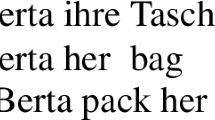Abstract
This paper argues that Mandarin bei passives can be licensed by accomplishment events. It is observed that certain gapless bei passives have neither a syntactic gap nor an indefinite and hence cannot be accounted for by the A’-movement analysis or the binding analysis. This paper shows that if the complement clause of a bei passive denotes an accomplishment event, the bei passive can be licensed even if it is gapless or doesn’t contain an indefinite. It is further suggested that such passives, just like other types of bei passives, have an operator-variable structure in the complement clause. In these gapless bei passives an empty operator Op binds the embedded tense and abstracts over time.
Similar content being viewed by others
References
Chappell, Hilary. 1986. Formal and colloquial adversity passives in standard Chinese. Linguistics 24: 1025–1052.
Chen, Yi-Ching, and T.-H. Jonah Lin. 2014. The syntax and semantics of changing and becoming in Mandarin Chinese. Paper presented at the 22nd meeting of International Association of Chinese Linguistics and the 26th meeting of North American Conference on Chinese Linguistics, University of Maryland, College Park.
Chomsky, Noam. 1995. The minimalist program. Cambridge: MIT Press.
Davidson, Donald. 1967. The logical form of action sentences. In The logic of decision and action, ed. Nicholas Rescher, 81–95. Pittsburgh: University of Pittsburgh Press.
Diesing, Molly. 1992. Indefinites. Cambridge: MIT Press.
Dowty, David. 1979. Word meaning and Montague grammar. Dordrecht: Reidel.
Enç, Mürvet. 1986. Toward a referential analysis of temporal expressions. Linguistics and Philosophy 9: 405–426.
Feng, Shengli. 1995. The passive construction in Chinese. Studies in Chinese Linguistics 1: 1–28.
Heim, Irene R. 1982. The semantics of definite and indefinite noun phrases. Ph.D. dissertation, University of Massachusetts, Amherst.
Her, One-Soon. 2009. Unifying the long passive and the short passive: On the bei construction in Taiwan Mandarin. Language and Linguistics 10: 421–470.
Higginbotham, James. 1995. Sense and syntax. Oxford: Clarendon Press.
Higginbotham, James. 2000. On events in linguistic semantics. In Speaking of events, ed. James Higginbotham, Fabio Pianesi, and Achille C. Varzi, 49–79. Oxford: Oxford University Press.
Huang, C.-T.James. 1988. Wo pao de kuai and Chinese phrase structure. Language 64: 274–311.
Huang, C.-T.James. 1999. Chinese passives in comparative perspective. Tsing Hua Journal of Chinese Studies, New Series 29: 423–509.
Kratzer, Angelika. 1995. Stage-level and individual-level predicates. In The generic book, ed. Gregory N. Carlson and Francis Jeffry Pelletier, 125–175. Chicago: The University of Chicago Press.
Kratzer, Angelika. 1998. More structural analogies between pronouns and tenses. In Proceedings from the 8th conference of semantics and linguistic theory, ed. Devon Strolovitch, and Aaron Lawson, 92–110. Ithaca: CLC Publications.
Li, Y.-H. Audrey. 1990. Order and constituency in Mandarin Chinese. Dordrecht: Kluwer.
Li, Charles N., and Sandra A. Thompson. 1981. Mandarin Chinese. Berkeley: University of California Press.
Lin, Jowang. 2000. On the temporal meaning of the verbal -le in Chinese. Language and Linguistics 1: 109–133.
Lin, T.-H. Jonah. 2009. Licensing “gapless” bei passives. Journal of East Asian Linguistics 18: 167–177.
Montague, Richard. 1969. On the nature of certain philosophical entities. In The Monist 53: 159–194.
Parsons, Terence. 1990. Events in the semantics of English. Cambridge: MIT Press.
Parsons, Terence. 2000. Underlying states and time travel. In Speaking of events, ed. James Higginbotham, Fabio Pianesi, and Achille C. Varzi, 81–93. Oxford: Oxford University Press.
Parsons, Terence. 2002. Eventualities and narrative progression. Linguistics and Philosophy 25: 681–699.
Partee, Barbara H. 1973. Some structural analogies between tenses and pronouns in English. The Journal of Philosophy 70: 601–609.
Stowell, Tim. 2007. The syntactic expression of tense. Lingua 117: 437–463.
Sybesma, Rint. 1992. Causatives and accomplishments: The case of Chinese ba. Ph.D. dissertation, Leiden University.
Tai, James H.-Y. 1984. Verbs and times in Chinese: Vendler’s four categories. In Papers from the Parasession on Lexical Semantics, ed. David Testen, Veena Mishra, and Joseph Drogo, 289–296. Chicago: Chicago Linguistic Society.
Tang, Sze-Wing. 2001. A complementation approach to Chinese passives and its consequences. Linguistics 39: 257–295.
Ting, Jen. 1998. Deriving the bei-construction in Mandarin Chinese. Journal of East Asian Linguistics 7: 319–354.
Author information
Authors and Affiliations
Corresponding author
Rights and permissions
About this article
Cite this article
Lin, TH.J. Gapless bei passives licensed by accomplishment events. J East Asian Linguist 24, 193–215 (2015). https://doi.org/10.1007/s10831-014-9127-5
Received:
Accepted:
Published:
Issue Date:
DOI: https://doi.org/10.1007/s10831-014-9127-5




